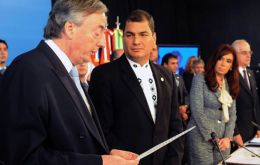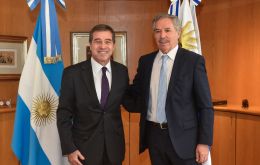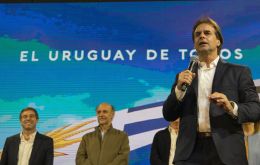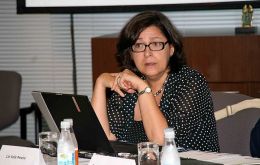MercoPress. South Atlantic News Agency
Tag: Ernesto Talvi
-
Monday, April 6th 2020 - 11:22 UTC
“Greg Mortimer” off the coast of Uruguay has 81 passengers tested positive

Eighty-one people on the Greg Mortimer cruise ship, which has been stranded off the coast of Uruguay for almost two weeks and has over 90 Australians on board, have tested positive for coronavirus.
-
Wednesday, March 11th 2020 - 09:11 UTC
Uruguay abandons Unasur and rejoins the TIAR reciprocal assistance treaty

The Uruguayan government announced on Tuesday that it was withdrawing from the Union of South American Nations, Unasur and returning to the Inter-American Treaty of Reciprocal Assistance, TIAR.
-
Friday, February 21st 2020 - 08:40 UTC
Argentina pressing Uruguay on Falklands' RAF flights landing in Carrasco

Argentina is again putting pressure on Uruguay, this time on the incoming government which takes office next March first, insisting no UK military aircraft linked to the Falkland Islands be allowed to land in the country's airports and Falklands should not be treated as state with which Uruguay has extensive trade and business exchanges.
-
Monday, February 17th 2020 - 08:54 UTC
Incoming Uruguayan foreign minister invited by Argentina's Felipe Solá

This Tuesday the incoming Uruguayan foreign minister Ernesto Talvi will be in Buenos Aires on an invitation from his future peer Felipe Solá, which has been interpreted as the first formal contact between the Kirchnerite government of Alberto Fernandez and that of president-elect Luis Lacalle Pou, who takes office on March first.
-
Monday, November 25th 2019 - 09:59 UTC
Uruguay's presidential runoff results delayed because of the very tight results

Uruguay Sunday's presidential runoff results have been so tight that the Electoral Court will only make a definitive announcement sometime late this week after it has completed counting all votes, including some 34.000, classified as “observed”. This is because the difference between the two candidates is some 29.000 votes.
-
Tuesday, October 8th 2019 - 09:56 UTC
Uruguayan election: “a ponies race, no thoroughbreds competing”

On Sunday 27 October the Uruguayan electorate will be voting for a new president (there is no immediate reelection) and a renewed Legislative, 30 Senators and 99 Lower House members. Uruguay is one of the more stable countries in the region, both it's solid institutions as well as its citizens who are deeply committed to democracy, social rights and a strong presence of government in the economy.
-
Monday, July 1st 2019 - 09:59 UTC
Uruguay: No surprises in a primary with a record of candidates

In a primary election full of new faces and overshadowed by accusations of “dirty” campaigns, there were no surprises in the results of the internal elections of Uruguay's main political parties, according to the data of the pollsters. Daniel Martínez (Frente Amplio), Luis Lacalle Pou (National Party) and Ernesto Talvi (Colorado Party) will represent the three parties with the greatest adhesion in the country, starting a new stage in the national elections in October.
-
Tuesday, December 9th 2014 - 23:03 UTC
Mercosur lacks discipline and has become a 'straitjacket' for trade negotiations

Mercosur must discipline and return to its origin as a customs union since it has become a 'straitjacket' for negotiations with other regional blocks, according to Lia Valls, foreign trade coordinator at the Brazilian Economics Institute belonging to the prestigious thinktank Getulio Vargas foundation.
-
Monday, December 17th 2012 - 06:03 UTC
Talvi says Uruguayan government reacts with ‘authoritarian ticks” to criticism

The head of an economics think-tank said that the Uruguayan government reactions to his criticisms of the management of the country’s economy are a kind of “authoritarian tick” which pretends to censor all those who do not share the “official truths”.
-
Wednesday, December 12th 2012 - 19:34 UTC
Uruguay’s fiscal and salaries policies out of control plus heterodox ‘solutions’ rumours

Uruguay has “politicized the management of its economy” with the government letting the “trade unions and its political allies” master the country’s budget and the salaries policy, claimed Ernesto Talvi a conservative economist from the local think-tank CERES who is also a World Bank consultant.
